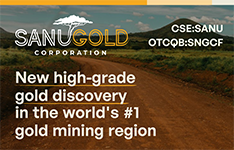The Life Sciences Report: You're a young CEO, now 33 years old. You founded MusclePharm Corp. (MSLP:OTCPK) after playing wide receiver in the National Football League (NFL). I'm wondering about your personal experience. Did you find nutritional supplements to be a big help to you as a college and pro football player? Do they really make a difference when added to standard training?
Brad Pyatt: I would say yes. Supplements support athletes who are at a high level and non-athletes just looking to increase their fitness. And though I wish there were such a thing, supplements are not miracle pills and powders.
If you have a good regimen of nutrition and training, supplements become the third plank of the program. Athletes and others will see a huge difference in performance, particularly with our supplements—although there are certainly other good supplements out there. For those who want a miracle in a bottle and don't want to put effort into working out or eating healthy, supplements won't do much.
TLSR: What moved you to start this business?
BP: I've been taking supplements since I was about 16 years old, and I've taken everything from creatines [which build muscle mass] to proteins to fat-loss products. Oftentimes young athletes, young consumers—and even novice consumers, regardless of age—are duped by marketing. I bought into what the advertisements were saying. I was at a high level of training, lifting and eating well, but despite all of this—and the supplements—I continued to be injured.
"Though I wish there were such a thing, supplements are not miracle pills and powders."
It wasn't until I got into the NFL that my strength coach looked at what I was taking, because he didn’t understand why my injuries persisted despite what I was doing to stay healthy. We found out that the products I was taking were the reason for my injuries. They were hindering my performance, unlike what the marketing materials claimed.
I decided to do something about this. But I couldn't just stop taking supplements because, as an athlete who had taken them for so long, it was a crutch, a mental thing for me. They were part of my regimen. I had to find a way to make supplements better for athletes, particularly myself at the time.
TLSR: How did you start this process? Where did you go for help?
BP: Obviously, being in the NFL, I had resources at my disposal, so I was able to team up with some very keen doctors, recognized worldwide in terms of sports nutrition and diet. I teamed up with some of the best. We started working on a supplement line when I was in the NFL, and the product has evolved since then.
TLSR: How are your products differentiated from the other supplement brands on the shelves in stores?
BP: The difference is that we put real science behind our supplements. That's the initial step in creating our formulations. We have a team of scientists, along with two full-time Ph.D.s and one full-time physician, on staff. We also have a full scientific advisory board that includes the likes of Dr. Roscoe Moore, our chief scientific director, who is a former assistant U.S. surgeon general. We have people who were with Bristol-Myers Squibb Co. (BMY:NYSE) and other pharmaceutical companies. Essentially, we have an array of talent and brains behind what we do.
We are also defined by the practical application of our program. Once our scientists and doctors come up with a formula, we can conduct tests in our 30,000-square-foot Sports Science Center in Denver, which is equipped with every exercise machine that you could think of. For athletes, it's basically the NASA of sports science.
From playing over the years, there are several athletes who I still stay in touch with, and these athletes use our facility. We're able to test our products on athletes before they go to market. We also have several Major League Baseball teams, NFL teams, players, coaches and trainers that we send products to for feedback, before they come to market. This practical application, combined with science, is what makes our products different at the end of the day.
TLSR: I'm noting that you have developed a partnership with Arnold Schwarzenegger, former governor of California but really more famous as an action-adventure movie star. He was also Mr. Universe at one time. Some of the products in your portfolio are going to be branded with his name and presumably his likeness. He's an aging star now, having turned 66 back in July. Are you going after older clientele? Is this an untapped market?
BP: We're not going after any select demographic. The unique thing with Arnold is that he's probably the only figure in sports nutrition who can hit both the younger crowd and the older demographic, as well as the novice buyer. He appeals to everyone and anyone.
"Being in the NFL, I had resources at my disposal, so I was able to team up with some very keen doctors, recognized worldwide in terms of sports nutrition and diet."
Most people think of Arnold’s name when they think about fitness. You mentioned that Arnold was governor of California, but actually his first political appointment was to the chairmanship of the President's Council on Physical Fitness and Sports during the George H. W. Bush administration. The fact is, he's been heavily involved with fitness his whole life. Whether you think of the 1970s or 1980s, when Arnold was dominating as Mr. Universe and Mr. Olympia, or you look at films like The Terminator or Conan the Barbarian, the bottom line is that when you think Arnold, you think fitness.
TLSR: You just mentioned The Terminator and Conan. I'm noting that he has Terminator V coming out in 2015 and potentially another Conan film following that. Have you discussed the potential of MusclePharm–Arnold Series product placements in these films?
BP: Yes. Arnold and his team have been proactive in letting us know about future opportunities with movies that fit the supplement line, and we will have product placements in these movies. Though he's just completed filming The Expendables, our partnership hadn't begun in time to get product placement into that movie. It would have been a great one to be in. Arnold is filming a movie right now in New Orleans that isn't in line with nutrition or supplements, so we won't put products in that one. But as far as Terminator and Conan the Barbarian: If Arnold does those movies and there is a way to place the new Arnold Series products in those films, we would be very interested.
Let me say one other thing about Arnold. Given all of his fame, he's unique in that he brings humility to a partnership. When we work with him, it's not really an endorsement deal. He's actually pushing us to do more stuff with him, which is unique. A lot of the athletes we've worked with on endorsements have been very good, but due to commitments they already have, they don't go over and above. Arnold is one of those unique people who really engages a partnership and looks for every way to make it successful. Everything he touches turns to gold for a reason.
TLSR: I understand that you are attempting to get into the female athlete market. Tell me a bit about it.
BP: Yes, we are. Again, when we started this company, we had a male athlete-dominant focus because that's what I know best. As we grew the market, we saw significant opportunity among women athletes, and saw how a line of products could potentially gain momentum in that market.
"We also have several Major League Baseball teams, NFL teams, players, coaches and trainers that we send products to for feedback."
Let me give you a bit of background. At MusclePharm we have a cult following, and word of mouth is very good. A lot of our male customers were pushing their wives, girlfriends or moms to take the products. The only negative feedback we were getting was from male customers asking if the product might be too strong for their wives, or asking how much [their wives] should take. "She really likes the product and wants to take it, but she doesn't know if she's taking the right amounts. If I'm taking six pills, how much should she take?" We heard things like this over and over. It made perfect sense to keep it within the family, since there are already tons of men taking our product. If their wives or girlfriends want to take it, why shouldn't we come up with a female-friendly, tailored line? That's how the female athlete fitness product line evolved.
We cover all the product categories for women. We're one of the few companies that have done that, and we have been very successful in terms of the reception we've gotten from women. Going forward in the next couple of months, we will be moving the female fitness product into some larger retailers, particularly with Walgreen Co. (WAG:NYSE), GNC Holdings Inc. (GNC:NYSE) and CVS Caremark Corp. (CVS:NYSE), whose buyers are 70% women. We are excited about the potential of this line.
TLSR: I see that your Q2/13 revenue was up 51% to $28.5 million ($28.5M) from Q2/12. Your sequential growth was up 14% in Q2/13 from Q1/13. You are on track for a $100M run rate this year. If you had done $2M a year ago, I wouldn't be so impressed that you had done 51% better, but you're starting to build significant percentages on larger numbers. What has happened to drive this kind of growth?
BP: First and foremost, our success is tied to the team we've built. I come from a team-building lifestyle, playing football my whole life. I've learned that you need to surround yourself with the best people.
It also comes back to our doctors, and the quality of the products we've put out to the market. MusclePharm came out at the right time, when the market was looking for safe, scientific products. Our industry is not FDA-regulated, but it's getting more scrutiny. Companies must institute quality control, assurance and other safeguards.
I also think retailers enjoy partnering with us because they know we are here for the long haul, and that we're not going to jeopardize shelf placement with fly-by-night ingredients. That could ultimately take us off the shelf and not only hurt us, but also hurt our partners, whether it's Walgreens or Costco Wholesale Corp. (COST:NASDAQ). The two biggest things behind our growth are the people we've brought in and the safety and science that we put into our products.
TLSR: You turned cash-flow positive in Q2/13, but when do you expect to turn bottom-line positive? I'd also like to know when you think you can turn bottom-line positive and stay positive.
BP: That's a great question. We're doing everything we can to reach that goal, and our sales have been growing at light speed. The trajectory has been up. We've also done a lot of cleanup. I'm the first to admit that when I started this company, financing wasn't my strength. At the time, in 2008, no one was giving credit lines. No one wanted to invest in a new company.
TLSR: You picked a heck of a time to go into business, didn't you?
BP: Yes, but even in that crisis period I had the vision and knew I could get there. Climbing the financial ladder was tough, and we had to borrow and pay toxic rates. We took on every financing we possibly could; that we were allowed to do.
"The bottom line is that when you think Arnold, you think fitness."
We got to the point where, about six months ago, we were fortunate to get some investors who opened the door to OPKO Health Inc. (OPK:NYSE) Chairman and CEO Phillip Frost. Dr. Frost bought into the MusclePharm story and played a significant role in changing the capital structure of the company. Once he was involved, other sophisticated investors—institutional investors—were interested. With the help of Dr. Frost and these investors, we've cleaned up all the financing issues related to debt from years past, and are now debt-free. We really thought 2013 would be the year that we could be fully profitable, earnings before interest, taxes, depreciation and amortization (EBIDTA), without pulling out one-time charges or any stock issuances.
To answer your question, going into 2014 all the cleanup will be done. We won't do any more financings like those we had to do in the past. Nothing will be enacted that carries warrants or any type of derivative effect, because these are complex and have hurt our current valuation. Even for investors who are very sophisticated, our current balance sheet is complex and this is an area of focus that will be resolved in near future. Look for MusclePharm to have a full EBIDTA-type profit going forward, without any derivative liabilities associated.
TLSR: When you started this business, you had to give warrants. That was a very unusual time in our economic history, both in this country and globally. Do I hear you saying that you're going to get better terms on financings now? Or will you be able to grow organically without diluting investors further?
BP: Two things. We're pretty much done with financings while our stock is so undervalued. Dilution just doesn't make sense for the company and its shareholders at these levels. Our current capital position has improved dramatically over the last six months, we have a surplus of receivables coming in, and our cash flow is, for the first time, very strong. To your question, we're always going to need capital to grow this business, but we're in a much stronger and healthier position to negotiate with banks now, to get a standardized banking relationship.
Also, our balance sheet is strong. We have no debt, usually more than $6–8M on hand at any time and over $10M in receivables. Now banks are seeing this. At one point, even though our growth rate was huge, the balance sheet was so upside down that banks couldn't get comfortable. Investors can look forward to seeing some type of banking relationship, with a credit facility or asset-backed line, in the future. We are not going back and diluting shareholders at these levels.
TLSR: Selling, general and administrative (SG&A) expenses, which include marketing, are major overhead for you. You have the $100M run rate now, but what number is going to be critical mass for you? Would it be $200M, $300M? Where do you have to get to?
BP: I think we're almost there. If we can get the Arnold line into some bigger box stores, or our female athlete-targeted FitMiss product line into bigger box stores—Walgreens, Costco, Wal-Mart Stores Inc. (WMT:NYSE), whatever it may be—then this business will scale and hit a critical mass.
We feel confident that this business can scale to $150M in the coming years, if not more than $200M, without adding too much in SG&A costs—or marketing costs, for that matter. Marketing dollars will be allocated incrementally on what drives the sale. What I mean is, if we can spend $5M to get an extra $30M, we're going to do that. But we're going to monitor the marketing and SG&A through the next year to ensure we can hit that critical mass.
TLSR: You just mentioned some companies, one of which is Costco, where you have brand-new sales channels. Costco will be selling supersized, five-pound containers of your Combat Protein Powder, which will launch in mid-October in all the retailer's 400+ stores. These membership stores are able to negotiate very low prices with vendors, and you have geared up with new packaging, new labeling and new manufacturing capability. What protections do you have against Costco deciding not to sell your product?
BP: We really don't have any, but other strengths of MusclePharm are our sales and marketing teams. When a company breaks into these big retailers, there is always the risk of failure. . .but that comes with anything you do in life.
We have made a very calculated bet on what SKU (stock-keeping unit) we chose to go into Costco with. We picked Combat Protein Powder because it's one of our best-moving products—probably our No. 2 product in terms of sales, and we have rarely advertised it in the past. We know this product works. We also know that our customers, globally, are happy with the taste.
"As we grew the market, we saw significant opportunity among women athletes, and how a line of products could potentially gain momentum in that market."
We also understand that within Costco's sports nutrition group of products, the biggest category is protein. We knew that if we could get into that grouping, we would be in the company's highest volume category from day one.
Last, if Combat was to not do well by Costco's standards, and if we had to pick it back up, we have other channels for Combat Protein Powder. Other than shipping costs, there wouldn't be much risk associated with Costco deciding not to carry our product any longer. That's our biggest damage-control strategy for this channel.
TLSR: Investors are always looking two or three quarters ahead. Obviously, revenue growth is going to be a catalyst for your shares, but what should investors look for as far as catalysts that would herald revenue growth?
BP: I think continued distribution is what investors should look for. We're still a young company, barely five years old, and we've already picked up some of the large chains. Investors could look for a couple of specifics in terms of distribution. FitMiss would be a good category to look at, if it gets into some bigger channels. This is a high-margin product that will allow us to diversify our current MusclePharm customer base. Also, watch where the Arnold Series goes. That would be a great product to get out to the masses that shop in big box stores, and would really increase our top line.
Investors can also watch margins—and I think what they have to look for is margin dollars. There are certain initiatives that help us make money because we pay our bills with margin dollars, not margin percentages.
I think investors got too caught up on the margins last quarter, when there was a little frustration because these were down 4%. However, our margin dollars were up because we had taken steps to ensure that. If we go into a Walgreens with one of our protein SKUs, our margins are probably going to go down because those are not high-margin products. But, our margin dollars are going to go up significantly because of increased sales. That is one thing we're trying to make sure investors grasp when they think about MusclePharm. We have an array of products, and if we get a protein into a large, mass channel, it's really a loss leader because it's our first step in. These lower margin percentages allow us to expand within those distribution channels.
TLSR: Did you catch some of Peyton Manning's passes in Indianapolis?
BP: Yes, I caught a couple. I was lucky enough to be around people like Peyton Manning, (former Indianapolis Colts head coach) Tony Dungy and Bill Polian, who was president and vice chairman of the Colts and picked Peyton in the first round of the 1998 draft. It's funny to say this, but I built my business off what I learned from those three gentlemen. They represented the highest levels of success—from a general manager to a head coach to a future Hall of Fame quarterback. Each of them carried humility with them every day—and worked their butts off every day—and they were very successful at every level. I was very fortunate to be around that group of individuals, particularly Peyton Manning. Having him as a peer was an amazing opportunity, allowing me to learn how one of the greatest leaders in sports approaches each day to build his legacy. He's a machine.
TLSR: Peyton is like having another coach on the field, isn't he?
BP: George, you've never seen anything like it, especially at that high level, the respect people have for him. When you're in the NFL, everyone has already made it to the highest level. But to have someone like Peyton on your team, and to see how the players respond to him, is unbelievable. We're all grown men, and most people don't like to be lectured by a player, but Peyton does it in a way where you want to get behind him. He is one of very few people who can get on a player and have that player respond in a positive way. That's because he lives it. He's there every day, at the office before everyone else. He leaves after everyone else. He's football 100% of the time. He's one of the best leaders I've ever been around.
TLSR: Who is going to get to the Super Bowl this year? Tell me your AFC and NFC picks.
BP: I think the San Francisco 49ers have the best chance in the NFC. With the AFC, it could be a couple of teams. I think the Denver Broncos, with Peyton Manning, have an opportunity because the team has receivers and the machine—Peyton. The Broncos and Niners: That's what I was thinking. How about you?
TLSR: I love your picks. I'm a 49ers fan. Quarterback Colin Kaepernick has turned out to be everything Coach Jim Harbaugh thought he would and should be. It's just amazing to see a coach take a gamble like that, getting rid of a quarterback who was doing well and going with one who was not on the first team at the beginning of 2012.
BP: By the way, Kaepernick is one of our athletes. He signed a multiyear endorsement deal with us back in March and is going to represent MusclePharm in a series of radio advertisements, with television appearances and in social media outlets. We've been working with Kaepernick since he came into the NFL and he really fits our brand well. He was discredited, and people didn't give him the good look and opportunity that he deserved. Then he takes the 49ers to the Super Bowl. We're very excited to have him as part of our team. He has a bright future.
TLSR: Brad, this has been a lot of fun. Thank you.
BP: I appreciate it very much. I appreciate your time.
Brad Pyatt has served as the chief executive officer and director of MusclePharm Corp. since February 2010, and as president and CEO of MusclePharm LLC, since its inception in April 2008. His background includes seven years of experience as a professional athlete, and more than five years' experience in the sports nutrition arena. Pyatt played in National Football League for the Indianapolis Colts during the 2003, 2004 and 2005 seasons, as well as for the Miami Dolphins during the 2006 season. Pyatt also played in the Arena Football League (AFL) for the Colorado Crush during the 2007 and 2008 seasons. Pyatt attended the University of Kentucky from 1999 to 2002, where he studied kinesiology exercise science, as well the University of Northern Colorado from 2002 to 2003.
Want to read more Life Sciences Report interviews like this? Sign up for our free e-newsletter, and you'll learn when new articles have been published. To see a list of recent interviews with industry analysts and commentators, visit our Streetwise Interviews page.
DISCLOSURE:
1) George Mack conducted this interview for The Life Sciences Report and provides services to The Life Sciences Report as an independent contractor. He or his family own shares of the company mentioned in this interview: None.
2) MusclePharm Corp. paid The Life Sciences Report to conduct, produce and distribute the interview.
3) MusclePharm Corp. had final approval of the content and is wholly responsible for the validity of the statements. Opinions expressed are the opinions of MusclePharm Corp. and not Streetwise Reports or The Life Sciences Report or its officers.
4) The interview does not constitute investment advice. Each reader is encouraged to consult with his or her individual financial professional and any action a reader takes as a result of information presented here is his or her own responsibility. By opening this page, each reader accepts and agrees to Streetwise Reports' terms of use and full legal disclosure.
5) From time to time, Streetwise Reports LLC and its directors, officers, employees or members of their families, as well as persons interviewed for articles and interviews on the site, may have a long or short position in securities mentioned and may make purchases and/or sales of those securities in the open market or otherwise.












































